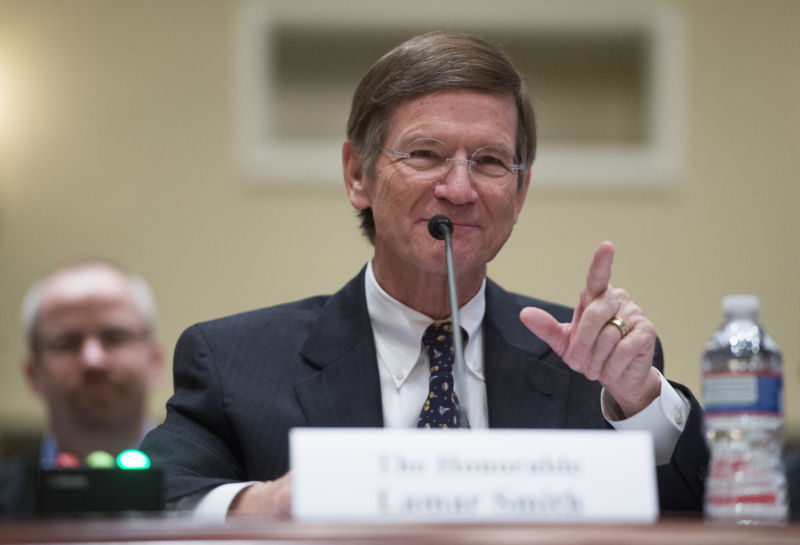
By now, there’s very little disagreement that the Russian government has been pursuing an organized social media campaign within the US. But there are still significant arguments regarding the goals and impacts of that campaign. Most of these center around the presidential election, but the Republicans on the House Committee on Science, Space, and Technology are doing their best to get people to consider an additional topic they argue has been specifically targeted by the Russians: the US energy economy.
According to a report released Thursday by Committee Chairman Lamar Smith (R-Texas), the Russian efforts were part of a specific campaign to suppress US development of fossil fuels. But the evidence presented in the report is pretty weak, and it seems to indicate the Russian troll farms were simply trying to get Americans to argue with each other.
The report released by the committee is a majority staff report, which means it was prepared without the Democratic members of the committee. And it’s an odd mixture of reasoned argument and selective interpretation of evidence.
Its overall conclusion keeps with the tendency of the majority in general, and Smith in particular, to promote fossil fuel interests: “Russian agents were exploiting American social media platforms in an effort to disrupt domestic energy markets, suppress research and development of fossil fuels, and stymie efforts to expand the use of natural gas.”
Why would Russia want to suppress US fossil fuel extraction? Here, the report’s reasoning is a bit mixed. Overall, it presents this as a matter of competition: “America’s emergence as a global energy exporter presents a significant threat to Russian energy interests. Such competition reduces the revenue and influence generated by Russian energy exports. This adversely affects the Kremlin’s ability to leverage Eastern Europe’s reliance on their energy and their ability to carry out their geopolitical agenda.”
Is the US’ rapidly expanding energy production a major threat? The answer is mixed. Russia only produces roughly a third of the coal that the US does, and the country isn’t a major player in that market, so coal is largely ignored in this report. The US’ booming oil production will have a small influence on global prices, but those were already extremely low due to overproduction by OPEC nations.
The one case that could be made is for natural gas. That’s largely shipped via pipeline, which is why parts of Europe are heavily dependent upon Russian supplies. But, as the US fracking boom continues, there are plans to liquify the natural gas and ship it overseas, which could influence the European market. Exports of liquefied natural gas, however, are just now ramping up, so it’s not a major issue at the moment. Still, suppressing US natural gas production could help preserve the status quo.
Science Committee vs. evidence
It’s hard to square Russia’s interests in the global energy economy with the analysis presented in the Science Committee report. It mentions that Russian social media posts targeted six different pipeline projects. But five of these are devoted to oil or petroleum products; only one will transport natural gas. The problems only begin there.
The report goes on to suggest that Russia is injecting money into environmental organizations that oppose fracking, turning them into what it terms “useful idiots.” But the only document this report has to support such a claim is a Republican Senate Committee report with a title that sounds like the product of paranoia: “How a Club of Billionaires and Their Foundations Control the Environmental Movement and Obama’s EPA.” Searching that document for instances of the term “Russia” draws a blank.
Then there’s the matter of the Russian-generated social media posts presented as evidence. Nearly all of the anti-fossil fuel examples in the report come from a single source, an account named “Born Liberal” on Facebook and Instagram. Many of these posts received a dozen shares or less, and its top Facebook post was shared fewer than 200 times. The account’s biggest success seems to have been an Instagram post that picked up 1,600 likes by falsely claiming that the state of Iowa had decided to get its power entirely from renewables.
Stunningly, the report also claims the Russians were being divisive regarding climate change. Congressman Smith has accused climate researchers of engaging in scientific fraud, and the committee he leads has misled the public about climate science. Yet the report spends a paragraph complaining that the Russians were muddying the waters:
Numerous Russian posts focused on the ongoing debate about climate change by linking catastrophic weather events to climate change and divisively labeling one viewpoint as right and one as left. One post characterizes Americans as ignoring major events that are allegedly signs of climate change. Additionally, these posts frame the conservative viewpoint regarding climate change as a “liberal hoax,” all in an effort to generate further domestic controversy surrounding the issue of climate change.
Alternative explanation
The last sentence of the quote above suggests a possible alternative explanation: the Russian bots and trolls were simply trying to create arguments among US citizens, and the accounts took both sides of the argument to do so. In fact, the report cites several examples of this, such as “numerous posts from a Russian account named ‘Heart of Texas’ advocated for pro-drilling and oil positions,” and “several Russian posts focused on the counter-narrative and sought to exploit anti-activist sentiment by propagating content supportive of pipeline construction efforts.”
In fact, the report approvingly quotes an article that describes the Russians as “intent on exploiting existing divisions and social movements in the United States.”
In other words, energy was just one of the many topics that the Russian groups identified as a political fault line within the US, and they attempted to exploit it by inflaming tensions rather than arguing for any specific policy. This conclusion, oddly, is better supported by the evidence presented in this report than the report authors’ favored conclusion.
https://arstechnica.com/?p=1268843

